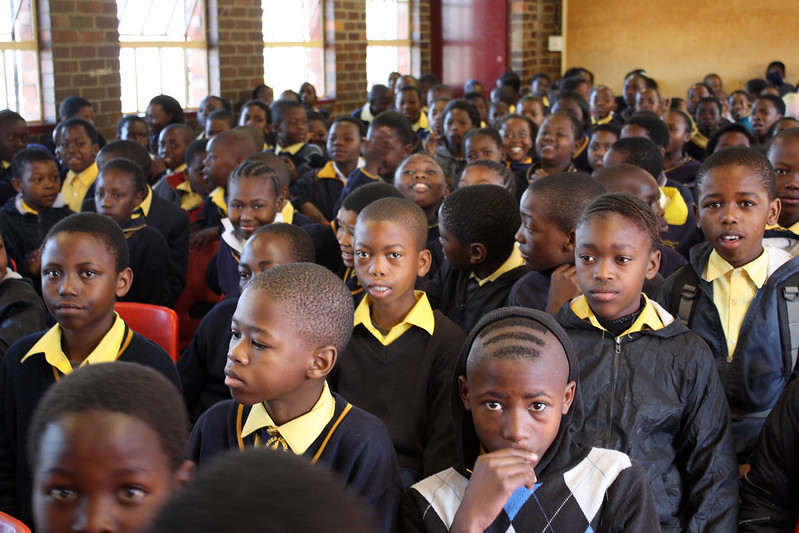Tackling Illiteracy Rates in South Africa
 Although there has been a rise in literacy rates over the past fifty years, UNESCO data shows that there are 763 million adults worldwide who still cannot read or write. Sub-Saharan Africa has an illiteracy rate of 34% as it currently stands, with illiteracy rates in South Africa being 10.2%, roughly around 3.9 million adults. However, all is not lost and conscious efforts are being made by the people to improve the literacy rate. Multiple NGOs are working hard to fix the problem.
Although there has been a rise in literacy rates over the past fifty years, UNESCO data shows that there are 763 million adults worldwide who still cannot read or write. Sub-Saharan Africa has an illiteracy rate of 34% as it currently stands, with illiteracy rates in South Africa being 10.2%, roughly around 3.9 million adults. However, all is not lost and conscious efforts are being made by the people to improve the literacy rate. Multiple NGOs are working hard to fix the problem.
Root Cause of the Problem
During apartheid, the South African government implemented many policies that allowed for racial segregation and discrimination to take place, in the education system and other governmental systems alike. In 1953, the government announced the Bantu Education Act which replaced local schools with more schools under government control to decrease learning opportunities for black students.
According to a Stanford University article, 96% of teachers held education certificates in white schools compared to a measly 15% in black schools.
Unfortunately, the legacy continues today, with schools having inadequate infrastructure, overcrowded classrooms and a shortage of qualified teachers. Barriers such as hunger and malnutrition further exacerbate the problem of illiteracy in South Africa.
Empowerment Through Education
Many different charities are currently working hard to tackle the problem of the illiteracy rate in South Africa. MySchool MyVillage MyPlanet community program work continuously supports and raises funds for schools, charities and welfare organizations. Most recently it cooperated with different organisations to tackle the issue. The program collaborated with Builders and most recently created three Grade RR classrooms for a non-profit school in Cape Flats. Adri Marais, CEO of the school Christel House stated: “These top quality grade RR classrooms are putting an additional 60 students per year on a pathway out of poverty.”
Relate Bracelets and Shine Literacy are two non-profits that have also collaborated to help tackle illiteracy rates in South Africa. Relate Bracelets is an organization creating handmade bracelets whilst providing employment opportunities for underprivileged individuals, its focus is to create sustainable initiatives. Shine Literacy focuses on early intervention programs which support reading and writing skills for Grade 2 and Grade 3 students.
Although the program ended, the two organizations worked to raise funds and awareness for literacy initiatives. This collaboration aimed to encourage the culture of reading amongst children, and its main goal was to create a nation of lifelong readers and learners.
Nal’ibali
Nal’ibali, a national reading campaign in South Africa has been making strides to improve the literacy rate in the country. Nal’ibali aims to create and nurture a culture of reading in children and for all children to have positive experiences with stories and reading books.
In 2022, Nal’ibali reached more than 22 million people (37% of the target) through radio, television and by distributing material to read. The organization also reached more than 2 million children (75% of the target) through children read to on World Read Aloud Day, as well as various reading programmes and partnerships. It frequently collaborates with PRAESA to develop and implement literacy programs, and the partnerships help to make their initiatives more accessible for everyone.
Unified Efforts
South Africa has taken many legislative and policy measures to address the illiteracy rate and alleviate the problem. In September 2024, President Ramaphosa signed a law which made one year of pre-primary education compulsory. In 2024, the Basic Education Laws Amendment Act was also enacted to introduce compulsory education, regulated homeschooling and the abolition of corporal punishment backed by fines.
Despite these advancements, challenges still exist when it comes to tackling illiteracy rates in South Africa. A significant literacy gap remains and unified efforts are necessary to end the problem. The enactment of the Basic Education Laws Amendment alongside the combined efforts of the multiple organizations mentioned in this piece demonstrates a commitment to reducing the illiteracy rate and nurturing a culture of reading across the country in general.
– Ayat Aslam
Ayat is based in London, UK and focuses on Good News and Global Health for The Borgen Project.
Photo: Flickr
